Results 1 to 10 of 55
Hybrid View
-
07-17-2011, 11:32 AM #1
 What actually is Hardness in natural stones, and how it affects sharpening
What actually is Hardness in natural stones, and how it affects sharpening
I have followed the Shoobie Doobie Asagi thread with great interest for weeks now, very nice stones shown here and there throughout and that thread as developed some great off topics. The topic of Hardness in Natual stones is universal and I do have some opinions about how it affects sharpeing that I would like to explore.
Sharpening is the act of removing steel, it is a grinding process that is used to create a geometrical profile to a blade. If a stone is not grinding it is not sharpening, period.
The hardness of a stone is the action at the stones very surface and it is all about the stones ability to shed particles from the stones surface during the sharpening process, period. All stones are hard, but their relative softness might be important also as an attribute.
I think it is overly complicated to merge synthetic stones and natural stone together in the discussion of natural stones, but to not recognize that some synthetic stones are hard or not is helpful in part because we here on this forum do use some of the same synthetics as others here do, so their names and numbers can be a jumping off point. But that is about as far as it goes in my opinion.
I know that some members would like to know if all Nakayama stones are harder than Ohira. This is not really a question with a logical answer as many will agree. Each natural stone is unique in itself, and even within one mine, any given strata will provide a wide varity of stone characteristics and hardness is one component that can vary slightly. And I further suggest that within any one mines history, the hardness of the stone mined can vary for particular reasons from one decade to another.
The hardness of a stone and a stones cutting abilities are related.
On the hardness side, if a stone does not shed dulled used grit particles, but instead retains those as bound up dulled grit particles on the surface, this is when the stones cutting speed begins to decrease and eventually halts. When it halts the cutting action, the stone action will only be that of polishing the blade, a burnishing effect, it will not continue to grind or remove steel. This is fine if you want a polished blade that looks shiny. As the glazing of the stone progresses I will suggest that the stone will continue to cut steel but with ever decreasing efficency and there will be a point in time when the cutting action actually stops. If you continue to rub the blade on the stone after this point other factors come into play as far as the metallurgy is concerned.
On the stones cutting abilities side, it must be recognized that not all stones are created equal, and as measured per weight some stones have a greater amount (per pound) of grit particles verses binder clays, while some stones on the other hand have less grit and a greater amount per pound of binder clays. The stone with more grit per pound will always have more cutting power if all other things are equal like surface hardness, grit size, etc.
If you an scratch a stone with a tool this is a crude type of proof of the hardness, the stone has in fact shedded grit particles. Incorporating a given force upon a tool with given and known characteristics, this simple test on a stone could be useful in rating stones as having a certain hardness. The closest entity we have on this forum to conduct this test are the various descriptions of hand pressure, and various qualities of tool steel in the from or shaving razors. This is a start. Alx
-
-
07-17-2011, 12:23 PM #2

the way i look at hardness is through density the more compacted the stone is the hard the stone will be the harder the stone the less of a cutter but it will be a better polisher
-
07-17-2011, 01:25 PM #3

trust me, it is not that simple
That is right, but what about polishing? There is evidence that at high grit ratings, the grinding action (ie. removing steel) gets less important.Sharpening is the act of removing steel, it is a grinding process that is used to create a geometrical profile to a blade
Tha major action here is a plastic deformation, rather than grinding (even though always both is present). Grinding per definition involves removing metal at a fast pace,
wich is hardly what we want to do. I would suggest reading some of this, b/c we always think there is so little knowledge about sharpening
but indeed there is. But it is disguised
Grind - Wikipedia, the free encyclopedia
Polishing - Wikipedia, the free encyclopedia
and heres something reall special, quite in depth theory of the difference in polishing and grinding
Metallography, principles and practice - Google Books
And heres another one about polishing mechanisms
http://www.asminternational.org/cont...85G_Sample.pdf
Maybe, but there are many exceptions to that rule. Not only is "hardness of a stone" still undefined,The hardness of a stone and a stones cutting abilities are related
but what I would call a very hard synthetic stone (the shaptons, 16000 or 30000 for example, or the pro 12000) may be extremely quick
at removing scratch patterns and cutting microbevels etc. The Shapton 16.000 is staggeringly quick and can (not should) be used after the Cerax 6.000 with a couple of circles.
My Shoubudani is it appears to me a harder stone than my Nakayama Kiita.
But it also appears to me that it is quicker.
So my prediction is that there won´t be any consens about what is hardness and how does it affect a stones performance.
There is too much to take into considerationLast edited by Lesslemming; 07-17-2011 at 01:41 PM.
-
07-17-2011, 02:35 PM #4

I have very little definitive knowledge about this topic. What little I know comes from a barber in Newark, NJ nearly 30 years ago, and my own hands on honing since then. He told me, when selling me a coticule, that the best razor hones are softer than harder. They would cut faster if they were soft, and you could tell if you dug into the edge of the coticule with your thumbnail and it left a mark.
Of course we can watch our water and see if the stone develops slurry merely from the honing action, or if we have generated a slurry with a slurry stone, how quickly the slurry turns color. This gives some indication of the speed of the stone's cutting power. I have tried the thumbnail test on a coticule or two but it doesn't really work for me. Is the mark I'm leaving caused by the coticule cutting my thumbnail or my thumbnail cutting the coticule ? Anyhow ....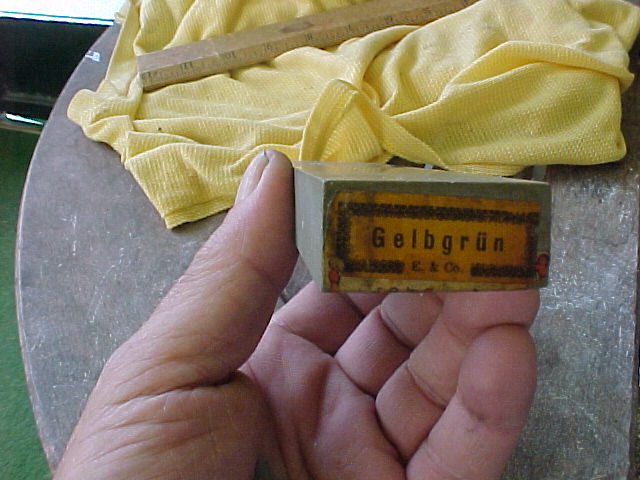
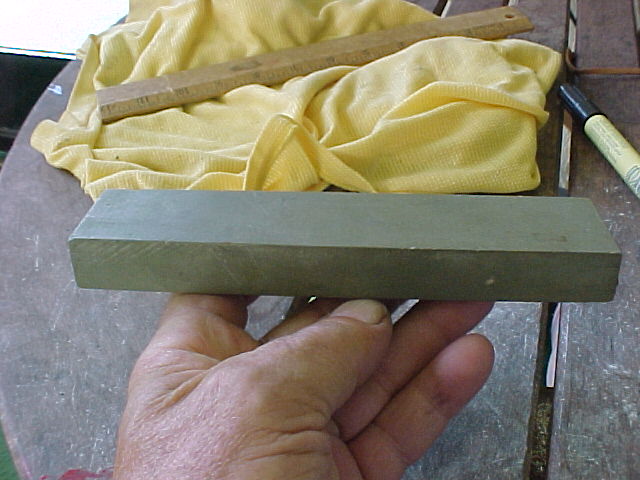
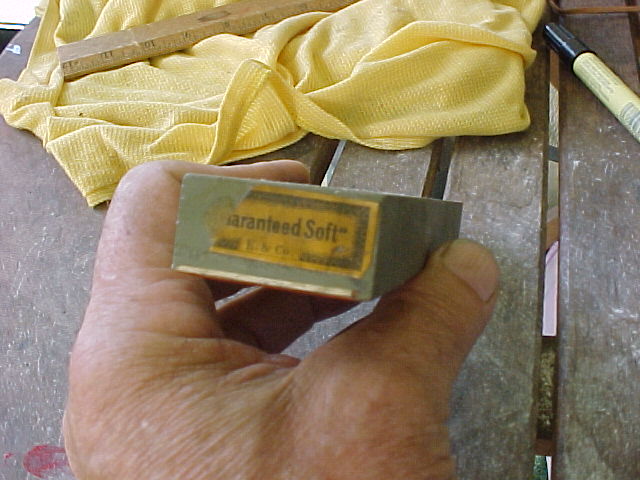
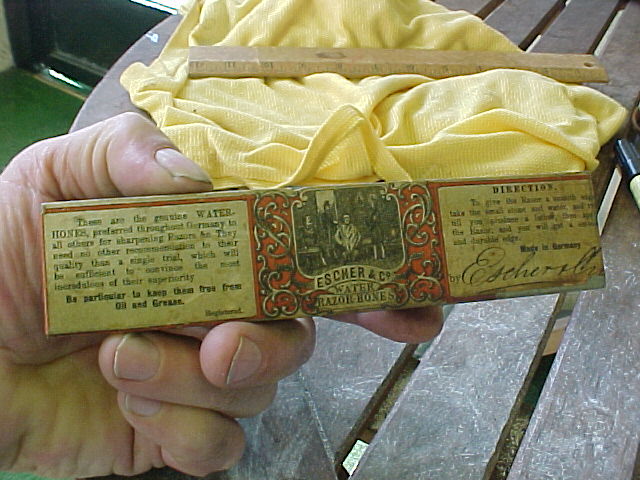
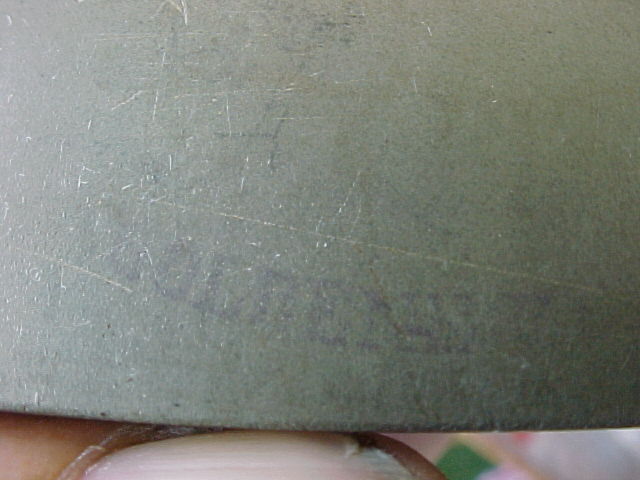
Then a couple of years ago I saw a yellow green Escher with two end labels. The first was the familiar "gelbgruhn", meaning yellow-green, and the opposite end had a label reading "guaranteed soft". I was very excited by this and was lucky to acquire the stone.
I already had the same stone without the guaranteed end label so after testing the stone and finding it equaled my y/g I sold it to finance some other craziness. I later regretted selling it, you can't have too many Eschers, and lo and behold lightning struck twice .... I found and acquired another.
So forgive me for cluttering your thread with photos of my prize, but I promised a friend to show some photos of it, and this is an ideal thread to insert them in. Note the last photo. There is part of an ink stamp on the honing surface indicating to me that the stone has never been used. A condition that I intend to remedy sooner than later.
-
The Following 3 Users Say Thank You to JimmyHAD For This Useful Post:
Disburden (07-17-2011), MODINE (07-17-2011), randydance062449 (07-17-2011)
-
07-17-2011, 02:53 PM #5

lesslemming you are right about there is alot to consider when it come to stones when i think of hardness i try to keep it simple and think of density most of the time but not all of the time the harder the stone the slower it cuts but hardness has nothing to do with speed of cutting its what the stone is made of the "cutting agent" (and speaking of only natural stones because synthetic's are a different animal) take the ark stones their made of microcrystalline quartz once you start honing on the stone the quartz wears down flat it doesnt break apart it gets smooth and flat jnats are the completely different you could have two jnats from the same mine same hardness one having su and one w/o the one with su will cut faster like you said its alot to think about
-
07-17-2011, 03:08 PM #6Senior Member

- Join Date
- Dec 2009
- Posts
- 217
Thanked: 35
Alex, thnx for the post.
Could you explain why some very hard stones
still have very good cutting abilities whereas
other hard stones are very slow? I know you
wrote that depends on grit per pound, but
what affects this?
The scratch test makes sense.
Basically what I would do, is I would hold the stone
in my hand to check its weight/density. Then I would
knock on the stone to listen what kind of sound it makes.
I assume a soft stone would make a duller,lower sound
whereas harder stones a more ''ping'', higer pitched sound.
Next thing I would do is sharpen on the stone, if I feel that
the surface of the stone is very hard(indentation wise, no
scratching ability), then I would think ''man this thing is like
glass!'' and conclude this is a hard/very hard stone.
Sharpman
-
The Following User Says Thank You to SharpMan For This Useful Post:
alx (07-17-2011)
-
07-17-2011, 03:17 PM #7
-
The Following User Says Thank You to eleblu05 For This Useful Post:
RogueRazor (02-11-2012)
-
07-17-2011, 06:06 PM #8

Hi Sharpman
Without actually trying out the particular "hard stone" I would venture to guess that some hard stones do cut very fast at first because they are loaded with grit. But if the swarf from the steel blade is not carried away in some manner, the stone will become loaded with compressed cleaved grit particles that are essencially welded into the voids of the stones surface along with ground off steel. This glazed stone will at this stage stop being a hone but more like a burnishing plate. Here again some people think that a bright shiny blade must be sharper, but I suggest that the metallurgical changes necessary to polish a blade a blade by burnishing will have mixed consequences including destruction of the temper of the steel maybe by a few points, and an ultra thin but very fragile edge that will only last a few shaves at best.
My Shapton 30k on glass becomes black when I use it, the grit is so sharp and the action is so fast and the stone so hard that the black metal filings just have no where to go but to fill up the surface voids of the stone. Do I just continue to use a stone that was pure white but is just becoming blacker and blacker? Or should I lap the stone to clean off the swarf and in doing so reveal fresh grit? When does the 30k start acting like a burnishing plate?
Also I like your idea of testing the hardness, totally sensual and empiric and based on observation. And the ping of a stone will deduce consistancy and reveal any imperfectons. The water test has some cautions with japanese stone. Some miners coated the top surface of freshly surfaced stones ready for market with an eggwash to prevent the soiling of the surface with grime and dirt. And also I have found that Jnats will over time from a natural oxidized film that is microns thin, both of these issues will imped water. So unless the stone is lapped, but with a used stone the water could be uses as an indicator. I have to agree that a dense stone will be more compact and will shed water more easily than a porous (more voids between physical particles) but also a dense stone may be less porous because of a high concentration of binders.
-
The Following User Says Thank You to alx For This Useful Post:
JimmyHAD (07-17-2011)
-
07-17-2011, 03:16 PM #9Senior Member

- Join Date
- Dec 2009
- Posts
- 217
Thanked: 35
Yes, but the Shaptons are synthetic stones. They are still quick,despite being
hard, because they are loaded with grit particles. If a fine and hard stone is very
quick that either means the particles are very hard(think diamond)or the stone
has a lot of sharpening particles per square unit or both. Might be wrong though.
SharpmanLast edited by SharpMan; 07-17-2011 at 03:18 PM.
-
07-19-2011, 12:02 AM #10

Maintaining a flat bevel geometry while sharpening for me is not as crucial with a razor as say a gouge or a plane blade. From discussions I have had here coupled with the fact that so many great shaves are accomplished from so many methods where flatness in not considered makes me think. An accomplished sharpener knows from experience that a harder stone will not deform and round the bevel. With the light pressure used in finishing up a razor, I wonder how stone hardness applies?
I have accomplished great edges happen on stones like the Nakayama from you which happen to be hard. Eschers also give me great results and as Jimmy noted they are considerd soft? Good food for thought, thanks


 23Likes
23Likes LinkBack URL
LinkBack URL About LinkBacks
About LinkBacks






 Reply With Quote
Reply With Quote


